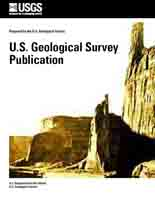Sedimentation survey of Lago Guerrero, Aguadilla, Puerto Rico, March 2006
Links
- More information: USGS Index Page (html)
- NGMDB Index Page: National Geologic Map Database Index Page (html)
- Download citation as: RIS | Dublin Core
Abstract
Suggested Citation
Soler-Lopez, L.R., 2009, Sedimentation survey of Lago Guerrero, Aguadilla, Puerto Rico, March 2006: U.S. Geological Survey Scientific Investigations Map 2990, 1 Plate: 35.14 × 23.29 inches, https://doi.org/10.3133/sim2990.
ISSN: 2329-132X (online)
Study Area
| Publication type | Report |
|---|---|
| Publication Subtype | USGS Numbered Series |
| Title | Sedimentation survey of Lago Guerrero, Aguadilla, Puerto Rico, March 2006 |
| Series title | Scientific Investigations Map |
| Series number | 2990 |
| DOI | 10.3133/sim2990 |
| Year Published | 2009 |
| Language | English |
| Publisher | U.S. Geological Survey |
| Contributing office(s) | Caribbean Water Science Center |
| Description | 1 Plate: 35.14 × 23.29 inches |
| Time Range Start | 2006-03-01 |
| Time Range End | 2006-03-31 |
| Country | United States |
| State | Puerto Rico |
| Other Geospatial | Aguadilla, Lago Guerrero |
| Projection | Lambert conformal conic |
| Online Only (Y/N) | Y |


